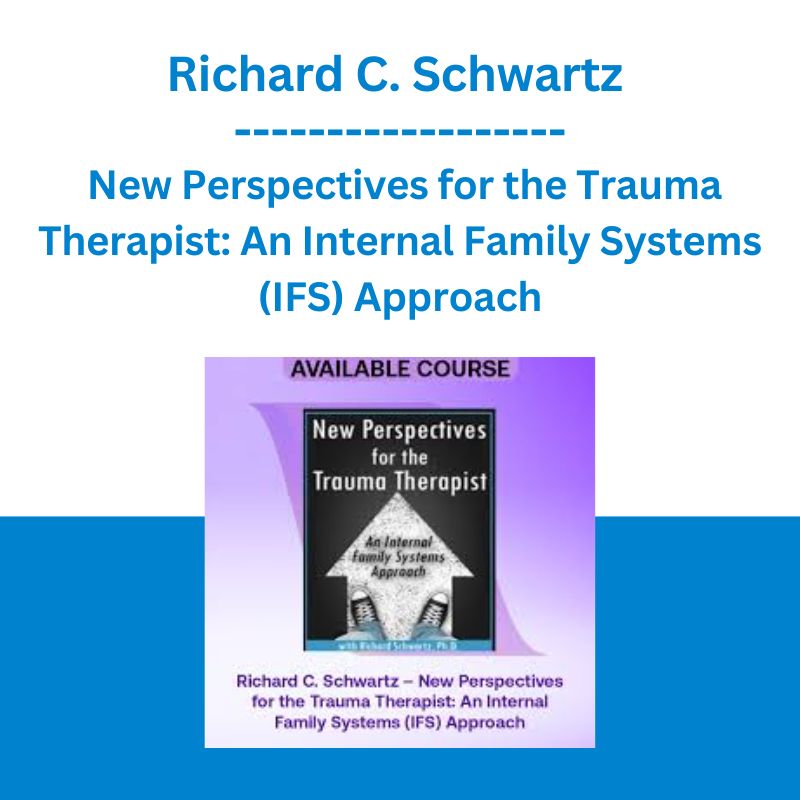*** Proof of Product ***

Exploring the Essential Features of “Richard C. Schwartz – New Perspectives for the Trauma Therapist: An Internal Family Systems (IFS) Approach”
Description
One of the chief obstacles to effective trauma treatment can be the therapist’s view of trauma symptoms like dissociation, rage, and suicidal thoughts as frightening evidence of deep pathology, rather than an expression of the natural human impulse toward self-protection. This workshop will demonstrate how the IFS model offers a way to enter into clients’ inner ecology without the overemphasis on containment and stabilization that’s common in trauma work today. You’ll learn an approach that moves more quickly by honoring clients’ inner protectors, getting their permission to access inner exiles, and contacting the core Self—a reservoir of calm, wisdom, and inner leadership. You’ll discover how to:
- Distinguish among a client’s “parts”—including protectors, managers, and exiles—and communicate and negotiate with each one
- Honor clients’ inner protectors and transform them to move quickly and effectively through the process of healing
- Shift the role of the therapist from primary attachment figure to a container who opens the way for the client’s core Self to emerge
- Use methods for honestly and transparently handling situations in which traumatized clients may trigger you
Speaker
Richard C. Schwartz, PhD
IFS Institute
Richard Schwartz began his career as a family therapist and an academic at the University of Illinois at Chicago. There he discovered that family therapy alone did not achieve full symptom relief, and in asking patients why, he learned that they were plagued by what they called “parts.” These patients became his teachers as they described how their parts formed networks of inner relationship that resembled the families he had been working with. He also found that as they focused on and, thereby, separated from their parts, they would shift into a state characterized by qualities like curiosity, calm, confidence and compassion. He called that inner essence the Self and was amazed to find it even in severely diagnosed and traumatized patients. From these explorations, the Internal Family Systems (IFS) model was born in the early 1980s.
IFS is now evidence-based and has become a widely-used form of psychotherapy, particularly with trauma. It provides a non-pathologizing, optimistic, and empowering perspective and a practical and effective set of techniques for working with individuals, couples, families, and more recently, corporations and classrooms.
In 2013, Schwartz left the Chicago area and now lives in Brookline, MA where he is on the faculty of the Department of Psychiatry at Harvard Medical School.
Speaker Disclosures:
Financial: Dr. Richard Schwartz is the Founder and President of the IFS Institute. He maintains a private practice and has an employment relationship with Harvard Medical School. He receives royalties as a published author. Dr. Schwartz receives a speaking honorarium, recording, and book royalties from Psychotherapy Networker and PESI, Inc. He has no relevant financial relationships with ineligible organizations.
Non-financial: Dr. Richard Schwartz is a fellow of Meadows Behavioral Healthcare and is a member of the American Family Therapy Academy and the American Association for Marital and Family Therapy. He is a contributing editor for Family Therapy Networker. Dr. Schwartz serves on the editorial boards for the Journal of Feminist Family Therapy, the Contemporary Family Therapy, the Journal of Family Psychotherapy, and the Family Therapy Collections.
Outline
The Parts Perspective
Goal of Therapist
Understanding the Goal of the Parts
Reducing the Client’s Fear
Accept the Voices
Vulnerable Parts and How to Work with Them
Improve the Relationship Between Parts
Map of Parts: Exiles, Managers, Firefighters
Rules of Parts That Protect the Self
Respect the Protectors
Vulnerability Reveals the Gift
Process of Therapy
Working with the Parts
Appreciating the Gift
Developing Trust with Parts
Including the Body
Inviting Qualities to Enter the Body
Clove of the Garlic
Objectives
- Determine how to distinguish among a client’s “parts”—including protectors, managers, and exiles—and communicate and negotiate with each one
- Determine how to honor clients’ inner protectors and transform them to move quickly and effectively through the process of healing
- Explore how to shift the role of the therapist from primary attachment figure to a container who opens the way for the client’s core Self to emerge
- Explore how to use methods for honestly and transparently handling situations in which traumatized clients may trigger you
Target Audience
Psychologists, Physicians, Addiction Counselors, Counselors, Social Workers, Marriage & Family Therapists, Nurses, and other Behavioral Health Professionals
Please see the full list of alternative group-buy courses available here: https://lunacourse.com/shop/









